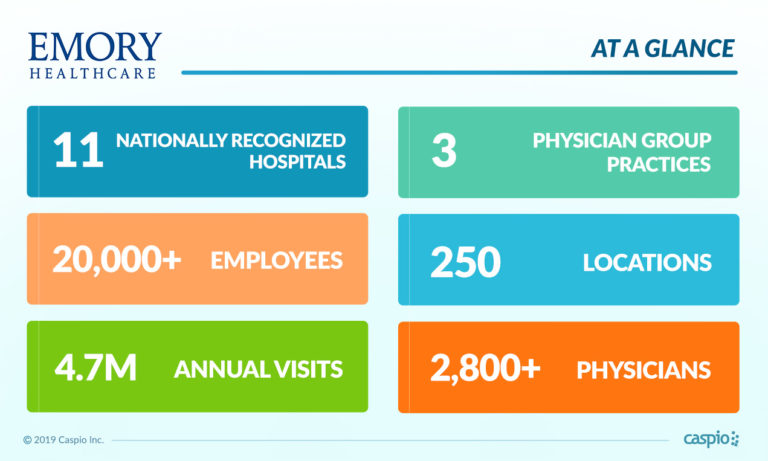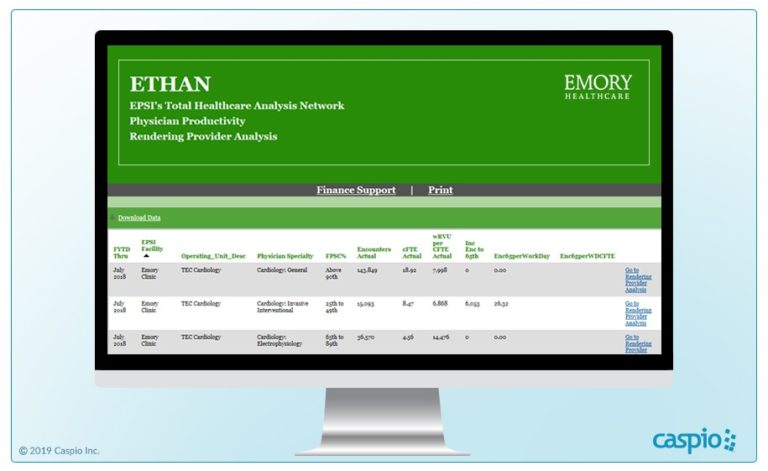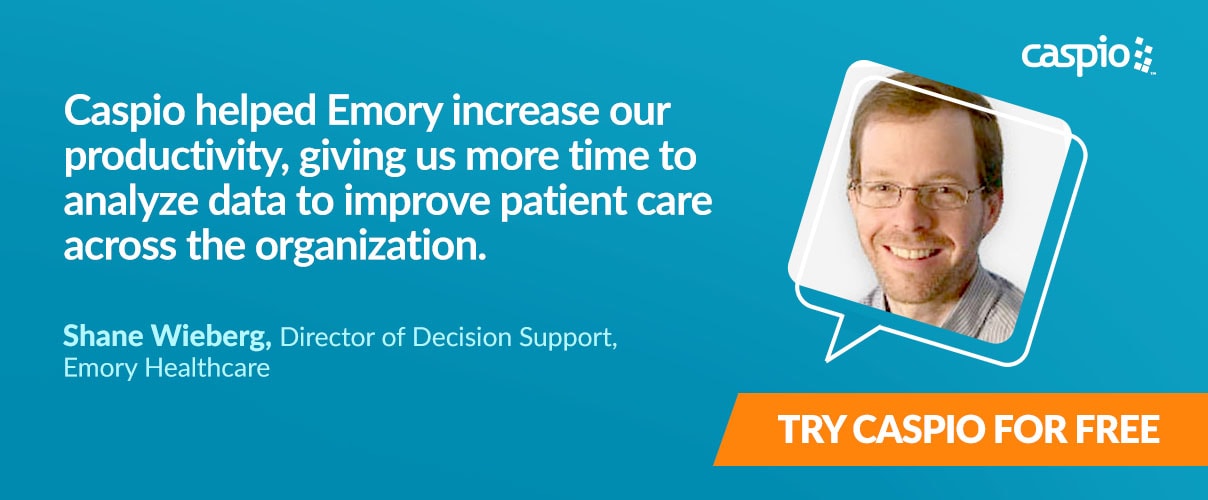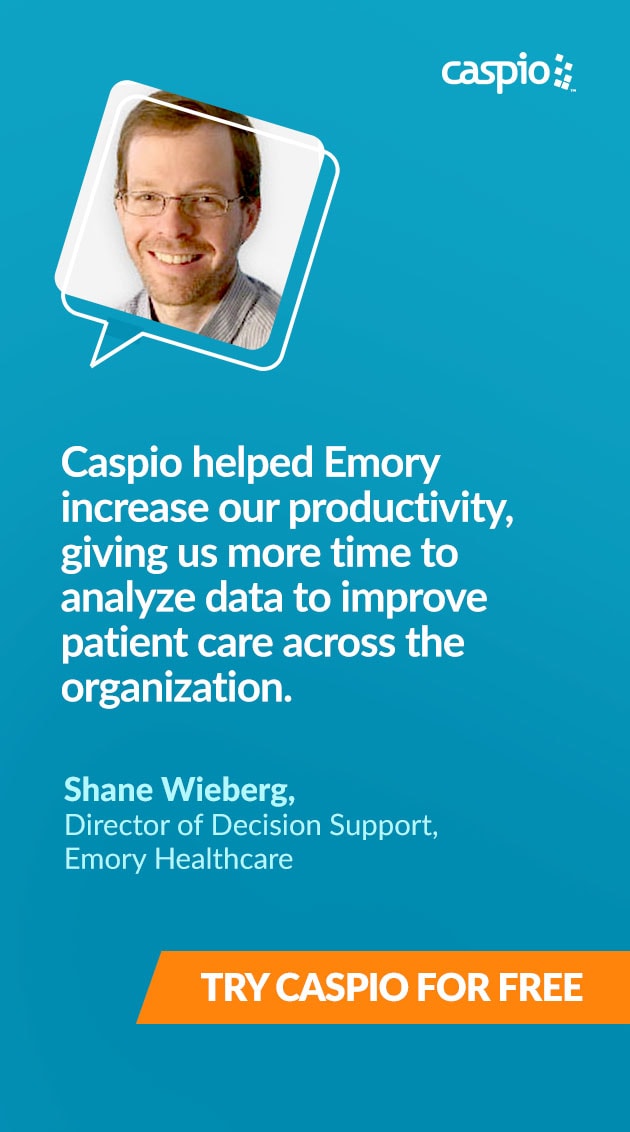
Emory Healthcare is renowned for being one of the nation’s leading university-based health systems. As part of Emory University, it is the largest health network in the state of Georgia with 11 hospitals, 2,800 physicians and 20,000 personnel spread across 250 locations. Many Emory physicians are internationally-recognized educators and researchers who have received countless awards for their contributions to the medical field.
Emory continuously strives to deliver innovative and emphatic care in every step of the patient’s journey. To improve patient outcomes, Emory decision makers must have all the information they need to make the right calls before, during and even after patient care.
“Decision support” plays a big role in this. It combines billing, claims and other financial figures with information that affects patient outcomes, such as physician effort and patient experience. By consolidating this data, Emory can see the trends and changes in the organization’s revenue and analyze how patient experience is impacted by specific factors.

Data Challenges in a Large Healthcare Enterprise
Considering the size and complexity of Emory, real-time data sharing was understandably challenging. Many departments depended on manual Excel-based processes, resulting in laborious data sharing between teams. It was also difficult to get an accurate picture of decision support metrics at a glance.
So, in 2009, Emory implemented a decision support system with the intention of integrating data collected from many sources. However, the system was found to be incompatible with some of the custom workflows in the Physician Group Practices (PGP) team, which handles the administrative and financial aspects of running the practice.
Emory started looking for an online database solution that would complement the existing decision support system while catering to the specific needs of the PGP team.
It was then that Emory’s partnership with Caspio was born.
Dashboards and Analytics with System-Wide Integration
Director of Decision Support Shane Wieberg oversees many aspects of Emory’s financial reporting systems, including implementation, budget administration, month-end operations and revenue cycle reporting. He and his team are also in charge of analytics, systems optimization and continuous improvement within the PGP system.
Prior to finding Caspio, the Decision Support department was losing hours trying to accommodate data requests. Instead of focusing on analytics and optimization, they were often emailing spreadsheets, compiling data and waiting for documents to be returned to them.
“Numerous spreadsheets were taking up too many productivity hours,” Wieberg said. “We needed to find a supplemental solution to drill into the physician-level data.”
They searched for possible solutions and chose Caspio for ease of use, interactive reporting, fast deployment and extensive integration capabilities. Wieberg and his team successfully built healthcare financial reporting apps that were compatible with Emory’s existing decision support tool — resulting in system-wide data integration and automation.
Accelerated Financial Reporting, Accurate Results
With the help of Caspio, Wieberg and his team eliminated labor-intensive manual processes. What started as a supplemental tool is now a full-scale financial analysis dashboard used by over 70 operating units. It incorporates data collection and verification, approval workflows and drill-down reporting – effectively streamlining financial reporting across the entire organization. In fact, reports that used to take two weeks to produce are now available in minutes. Everything is accessible through Emory’s one-stop administrative portal called “ETHAN”.
Using ETHAN, the Decision Support department can quickly access information on Emory’s financial processes, such as rendering provider analysis, finance-controlled accounts detail and charge lag days. Much of the data they need is fed by other systems within Emory using Caspio’s API, making ETHAN a truly integrated system.

Custom Workflows with Real-Time Tracking
Emory also digitized and automated two of its longstanding paper-based processes: capital expenditure requests and memorandums of understanding. These processes used to involve a lot of back and forth between stakeholders and required that the paperwork be physically couriered from one location to the next.
By transforming these into electronic workflows, Emory gained real-time tracking of every request and eliminated inefficiencies brought by paper-based processing.
All these changes are powered by Caspio’s low-code development platform.
“Caspio helped us increase productivity time in analytics while decreasing our time spent in spreadsheets. We can now deploy real-time reporting applications that are instantly available across the organization with built-in security and access controls,” Wieberg said.
Wieberg credits Caspio’s visual application builder for being able to design and launch sophisticated applications despite not having a programming background. The platform’s intuitive point-and-click tools help business developers build custom applications that can be deployed easily and made immediately available to end users.
Better Patient Care with Improved Decision Support
Wieberg and his team continue to make improvements to their custom applications each year by implementing process efficiencies and enhancing user experience.
“Having an application where we don’t have to manually compile things together gives us more time to analyze the data and put focus on what the system actually needs.”
Shane Wieberg
Director of Decision Support, Emory Healthcare
With less time wasted on manual data processes, Emory’s Decision Support team is able to focus on analytics and optimization, helping the whole organization make wiser, data-driven decisions that improve patient care and support.
Interested to learn how Caspio can help your healthcare or financial organization move away from spreadsheets?
Get started with a free trial or schedule a free consultation with one of our platform specialists to discuss your project requirements today.












